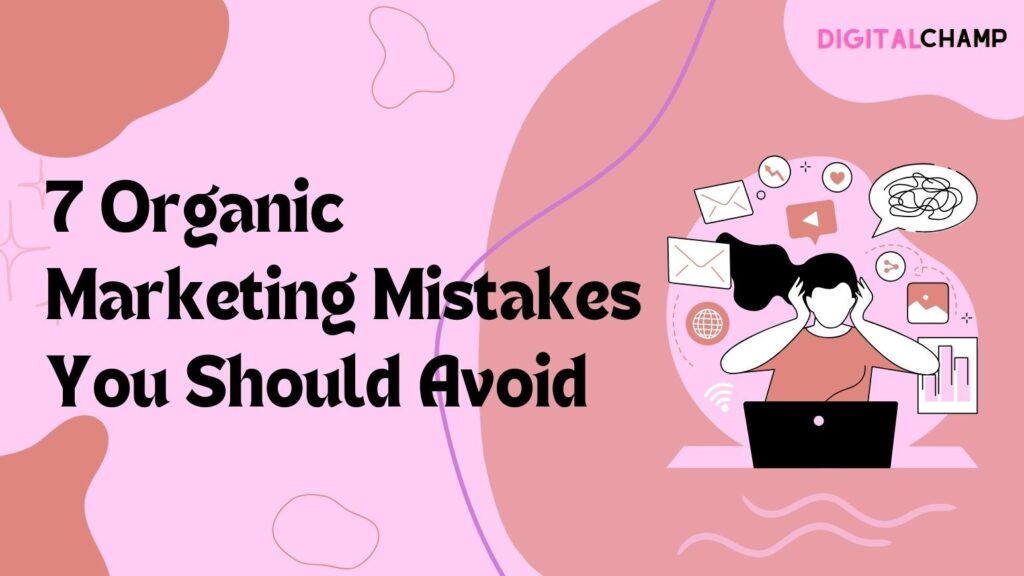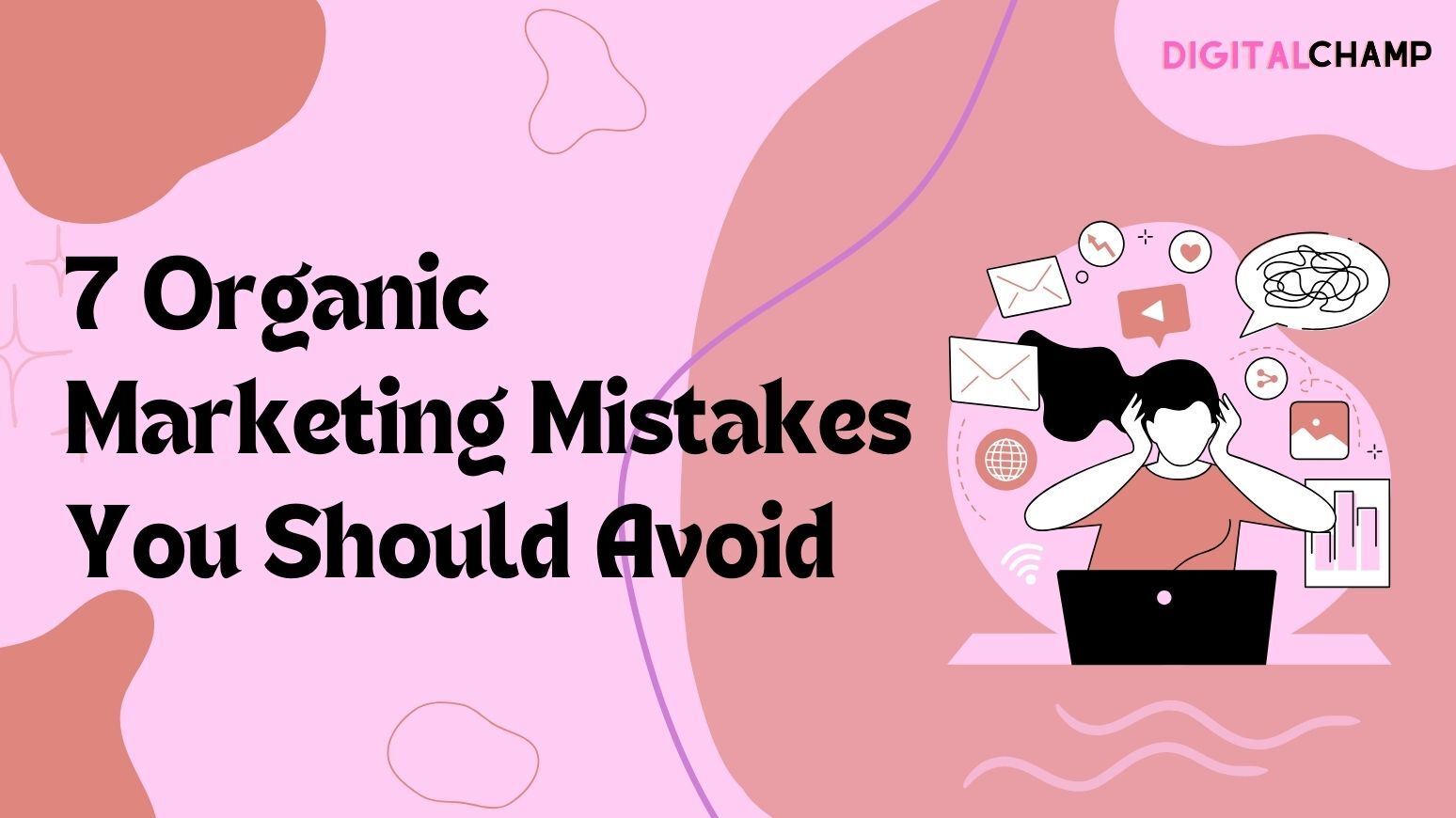
If you need to find anything, you look it up on Google like everyone else. Google alone processes nearly 99,000 search queries per second, about two trillion searches annually. To be ranked on Google’s search results pages is to win the battle as a business. Most businesses opt for a combination of organic and inorganic marketing techniques.
However, running campaigns can go wrong if you don’t know the right steps and tools. We’ll discuss common mistakes that can plague your marketing campaigns in today’s blog. Read along to discover potential marketing mistakes and how to avoid them.
But what is organic marketing?
Before we look at the mistakes that can plague your marketing campaigns, let’s first understand organic marketing. Organic marketing is a marketing technique that involves using promotional messages on different channels. Unlike paid marketing campaigns, organic marketing involves using these channels creatively to deliver the marketing message.
Organic marketing forms a big portion of common content marketing strategy. Close to 80% of content marketing efforts are organic in nature. Hence, organic marketing is a viable route for new and long-time businesses alike.
However, mistakes can and will occur if you fail on a few points. Let’s take a look at some mistakes that happen.
Organic marketing mistakes to avoid
Here’s a list of organic marketing mistakes that you should avoid:
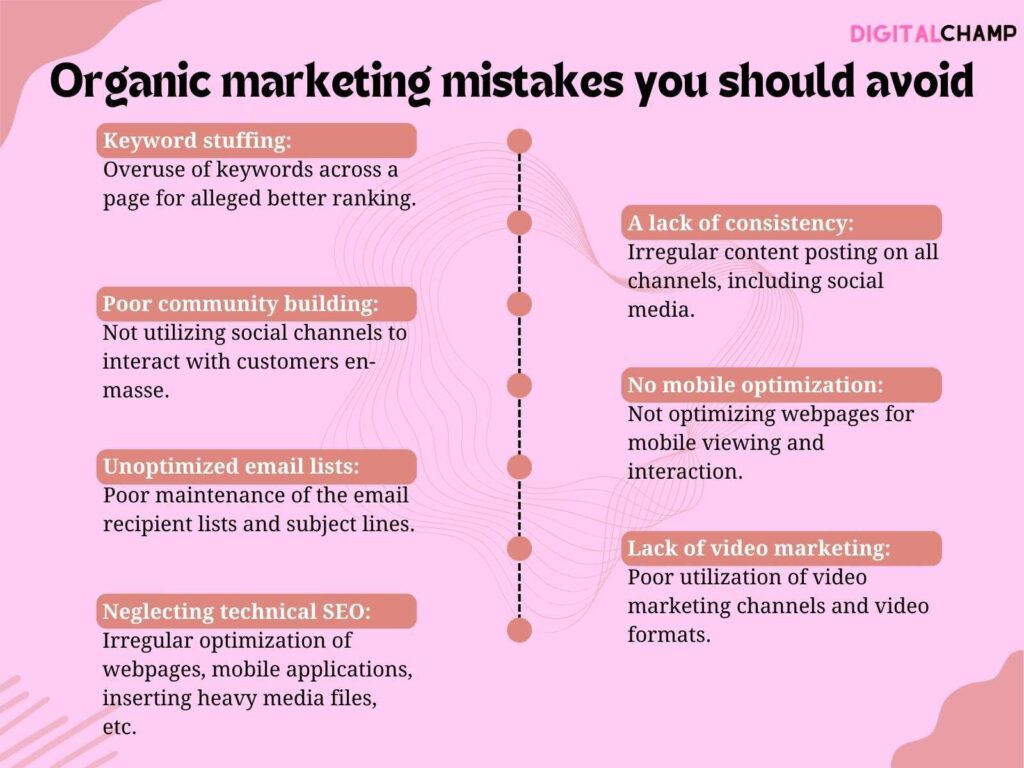
Keyword stuffing
One of the most common organic marketing mistakes is keyword stuffing. This compromises your business’s online presence.
Here’s how keywords work:
- A keyword is a word or phrase that best reflects the intent of your website, blog, product, service, or anything related to your business. For example, if you want to look for a car, all you have to do is type its name or the manufacturer’s name in the Google search bar, and the algorithm will extract and display all related terms.
- Based on their hierarchy and usage, there are two types of keywords: primary and secondary. A primary keyword is usually the keyword that is actually used to reflect the main intent behind a search, while a secondary keyword represents terms related to the primary keyword.
- It is suggested that you use between three to four keywords per page while writing the content for your website. Your primary keyword doesn’t necessarily have to be uniform throughout all website pages, as each page represents a different aspect of your business.
With that out of the way, let’s look at the errors that can plague your marketing efforts. Overutilization of keywords can harm your website and any other asset containing content.
Keyword stuffing only came to light in the late 1990s and early 2000s. Back then, websites were created with a ton of keywords that were, at times, placed randomly throughout a content piece. This decreased the readability and gave rise to spamming practices. Content pieces back then would be littered with primary and secondary keywords, giving shoddily constructed content pieces a better rank than actual content that drives value.
Clearly, some businesses and even writers were using this technique to gain traction. However, efforts were made to discredit such behavior; major updates from 2003, 2011, and 2013 ensured a fair ranking system that would detect and flag spammy content instead of promoting it. Now, you’re required to put your primary keyword in the URL, the title of the page, the meta description, and a few spots, depending on the content itself.
Your content pieces should give value to the readers at the end of the day, not the algorithm. If you create content that caters to your users’ needs, you’ll already be favored by the ever-evolving algorithm.
Consistency, or lack thereof
Organic marketing is a free-for-all venture that delivers if you’re persistent enough. However, people often take it for granted and plan for the initial few days, leaving out all the rest. This is one of those organic marketing mistakes that happen just as much, even today. Being consistent is the key to running a successful marketing campaign.
Content marketing involves using many channels to relay messages about your business. Being consistent helps create a reliable brand image among the public. Consistency also allows your marketing team to try and test new ideas for different campaigns. While running campaigns for social media channels, consistency can garner your brand constant engagement from people, giving insights into what works and what doesn’t.
Lack of consistency plagues an already running machine of ideas; your marketing team may get stuck in the water if it isn’t following a regimen. Hence, inconsistency should be feared if you’re a marketer.
Poor community building
Communities matter a lot in the digital age. Every brand builds one and tries its best to maintain it. Be it Facebook, YouTube, Reddit, or any other channel, communities offer reliable feedback on your products, customer support, and other aspects of your business. You can always rely on your customer’s feedback as they speak from experience.
Customers love communities so much that close to 76% wish their favorite brands had their respective communities, and brands try their best to create one. Building communities helps your business as it:
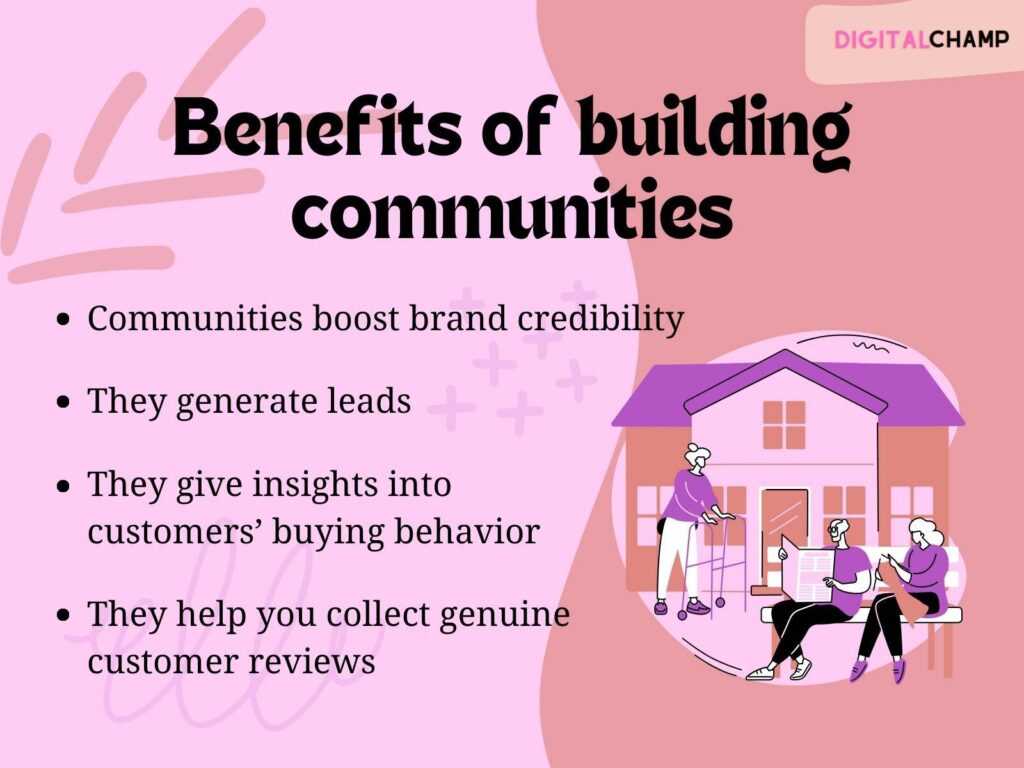
- Gives your brand credibility in the market.
- Puts you in a better position than your competitors who don’t have a community.
- Generates leads and promotes your brand through word of mouth.
- Gives honest reviews about your products and services that can be used for improvement.
- Gives insights into your customers and their buying behavior.
And a lot more. Building a community as a new business is quite easy; here’s how you can do it:
- Identify the pain points behind building a community.
- Reach out to people via email and social media messages.
- Draft the rules of engagement for your customers and additional rules for businesses that want to be a part of the community.
- Find a channel that allows you to build extensive and layered communities such as Discord, Instagram, WhatsApp, Facebook, Reddit, etc.
Little to no mobile optimization
Mobile phones are everywhere. The proliferation of ISPs and smartphones has increased content consumption over the years. In the early days, websites and other pages used to go online and could be viewed via PCs in offices and personal spaces. However, nowadays, most transactions happen on mobile phones through different applications and browsers.
About 50% of web traffic comes from mobile phones. Hence, optimizing your web pages for mobile viewing is crucial. Although major brands woo customers to use their mobile applications, not every customer really wants to download an app for every other seller. Therefore, special focus should be placed on optimizing the conversion pages.
Interactive websites garner more impressions from users across the globe. And if you’re able to pull it off with a website optimized for a mobile phone, chances are, your business will gain access to a big pool of potential leads and conversions.
Missing out on email lists
Sending emails is absolutely free. Everyone knows this, which is why everyone expects new mail in their mailbox. As of 2024, there are more than four billion active email users scattered across the globe. Businesses use emails for marketing purposes to a great extent. Emails, if handled correctly can not only give your business quality leads but fruitful conversions as well.
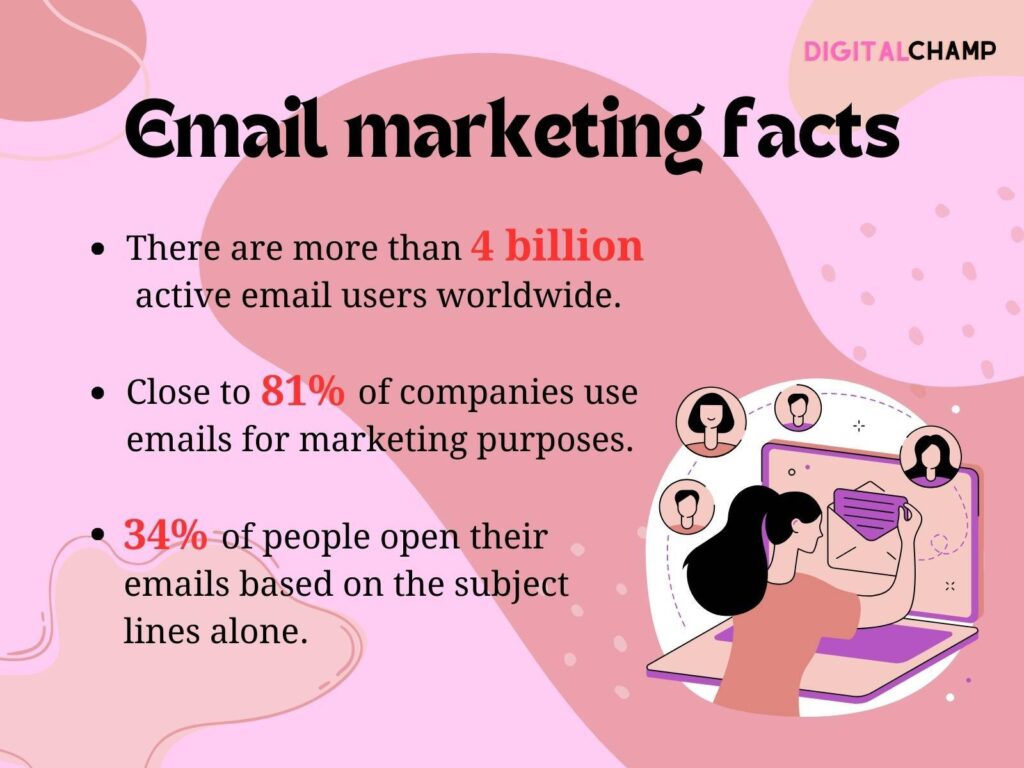
About 81% of companies use emails as part of their digital marketing strategies. Everyone checks their inbox at least once daily, so banking on this opportunity will greatly benefit your business.
However, not many businesses get email marketing right in their first go. Here’s what you need to avoid while running an email marketing campaign:
- Absence of an email recipient list: Every business should create a thoroughly researched list of people who will be sent different emails throughout the coming days, weeks, and even months. The first thing that businesses often miss out on is the segregation of urgent and regular email IDs. This leads to an unorganized mailing cycle that often misses out on crucial names that need to be contacted.
- Improper sending times: Another major mistake with new brands is that they don’t create a tracking method for all the emails they send. You need to have a system to track every mail from its point of origin to the point of conversion in case of a thread. New businesses often focus too much on sending alone that they fail to recognize when they’re supposed to send the mail.
- Using generic subject lines: Another rookie organic marketing mistake is the failure to capitalize on email subject lines. About 34% of people open their emails based on the subject line alone. If you’re using run-of-the-mill subject lines in the hopes of appealing to your potential customers, then you’re missing the whole point here. Emails are supposed to give value to the end user; hyperpersonalization, coupled with catchy but effective subject lines, is just as important as the body itself.
Lack of video marketing
Video marketing has been on the rise since 2018. As of 2024, close to 91% of brands worldwide use videos in their marketing campaigns. However, new businesses often make the organic marketing mistake of failing to utilize videos in the way they should. Here are a few major points that new businesses often miss out on:
- No live sessions: Streaming videos is on the rise across all video-friendly platforms. From Facebook to YouTube and Instagram, live streaming is a feature often delegated to influencers. However, not every business can afford an influencer, and they lack the know-how to go live on any channel. Going live often gives you honest and raw feedback for your product lineup, and you can even use a live session to launch a new product and gain instant reactions to it.
- Lack of marketing plans: Video marketing is just like every other marketing field with its own set of do’s and don’ts. One of the most crucial aspects of video marketing is relevancy, and brands maintain this by churning out videos almost every week. However, if the distribution of videos is uneven throughout the entirety of your campaign, then it can lead to uneven impressions throughout and might compromise actual conversions. Consistency is the key here but so is careful planning and publishing of all your video assets.
Neglecting technical SEO
Neglecting SEO or Search Engine Optimization in any shape or form is bad for your business. Because SEO not only guarantees your website’s place on the Google search engine results page but also helps you build credibility among your competitors. When users look up a term on Google, it is highly likely that they’ll refer to the first five links/results they come across. In order to drive fruitful conversions, you need to aim for the first position in your category or at least any of the top three positions on the page in the same category.
About 99.65% of pages do not get any traffic via Google, highlighting the extreme importance of optimizing your website and its pages for SEO best practices. This includes aspects like using keywords and interlinking pages with the right elements, as well as technical aspects such as page loading times, media size optimization, page indexing, etc.
Neglecting technical SEO deteriorates your website’s backend health as it compromises the indexing of pages, increases website loading times, fails to detect and repair broken links, stalls the Content Management System or CMS, and much more. Catering to technical SEO requires skill and a dedicated team of professionals who can point out anomalies.
Conclusion
Running organic marketing campaigns can be tricky at times, and making errors is a part of it. While it is okay to make mistakes, one should avoid repeating them in the coming iterations. The best way to avoid the aforementioned organic marketing mistakes is to be more attentive before finalizing a post, copy, or campaign idea. Double-checking and updating the tracking measures for your campaigns is the go-to way to reduce and eventually eliminate mistakes. Just remember not to be too harsh on yourself for mistakes, as they can happen to anyone; all you have to do is learn and inculcate your findings. We hope that you found our blog on the topic insightful. Stay tuned for more content pieces, and happy selling!

